25 May 2017. A device that sends rhythmic vibrations resembling heart beats into the wrist helps reduce stress among individuals facing the prospect of making a public speech. A team from Royal Holloway, University of London and Team Turquoise Ltd., the London-based company that makes the device, published its findings in the 23 May issue of the journal Scientific Reports.
The team led by Royal Holloway psychologist Manos Tsakiris evaluated the doppel, a device worn on the wrist like a watch, which sends tactile pulses into the wrist similar to a beating heart to reduce stress. The device is also connected by Bluetooth to a smartphone app. The doppel’s developers at Team Turquoise, spun-off from Imperial College London and the Royal College of Art in 2013, say the device is designed to provide a calming rhythm to which the body responds. Slower beats tend to produce a calming effect, while higher rhythms often induce physiological arousal.
Heart beats, note the authors, are probably the most familiar and ubiquitous natural rhythm people recognize. Tsakaris, a consultant to Team Turquoise, notes in a company blog post, “Not only high arousal is physiologically correlated with increased heart rate whereas calmness is physiologically correlated with lower heart rate, but we also intuitively associate higher and lower heart rate with anxiety or high arousal, and calmness respectively.”
The study recruited 52 individuals, mainly female and with an average age of 26, who were told the doppel measured blood pressure. The participants were asked to prepare a speech in 5 minutes on pros and cons of using animals in research, and then present the speech to a panel of 3 or 4 colleagues of the study leader. While all participants wore doppels, for half of the participants in a comparison group, the devices were turned off. For those who had working doppels, the device was set to provide heart beat pulses at a rate of 20 percent below their resting heart rate.
The researchers measured heart rates and skin conductance responses — ability of the skin to conduct electric current — as physiological measures of anxiety before and during the public speaking exercise. Participants also completed standard self-reported anxiety scales and questionnaires before and after the speaking task.
The results show participants wearing a working doppel exhibiting lower stress on most measures than the comparable group wearing a non-working device. Before the speaking exercise, participants in both groups recorded comparable scores on all measures. After the speaking task, all participants exhibited more stress than before, but doppel wearers had lower skin conductance responses and self-reported anxiety than individuals with a sham device. Average heart rates between the two groups were not large enough to be statistically reliable.
The company believes the doppel can fill a gap for people who want to control their stress levels, but without the time or circumstances for more intensive remedies. Company CEO Fotini Markopoulou notes, “While research shows that meditation and mindfulness can help to reduce stress over time, most of us don’t have this time to practice. Using doppel is a natural and distraction-free way to help the wearer to feel calmer, within moments, and when and where they want.”
Team Turquoise expects doppels to be on the market by summer 2017 in Europe and North America, selling for £125.00 in the U.K. and $US 179.00.
More from Science & Enterprise:
- Phones, Algorithms Boost Adherence to Stroke Meds
- Univ. Spin-Off Designing Heart Disease Screening App
- Sensors, Wearables Track Moods and Eating Behavior
- Mobile App-Controlled Patch Reduces Migraine Pain
- Biofeedback Device Reduces Panic Attacks in Trial
Hat tip: FirstWord Pharma
* * *


 RSS - Posts
RSS - Posts
[…] numerous downsides to heavy, constant surveillance. For one thing, it is going to increase employee stress hugely. It also goes against the idea that trust should go both […]